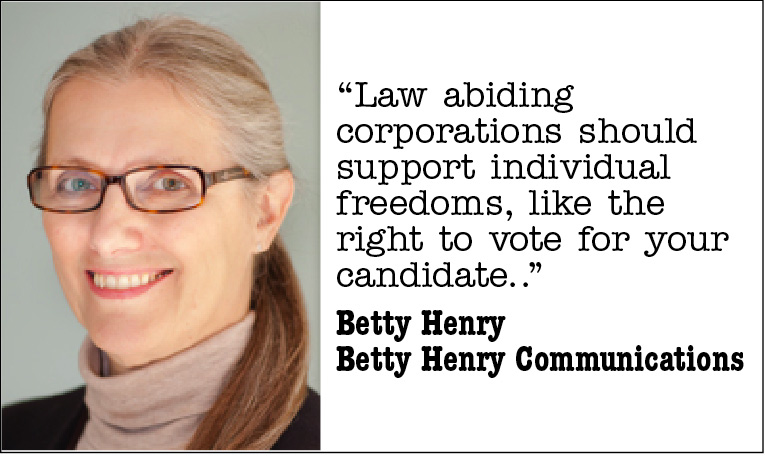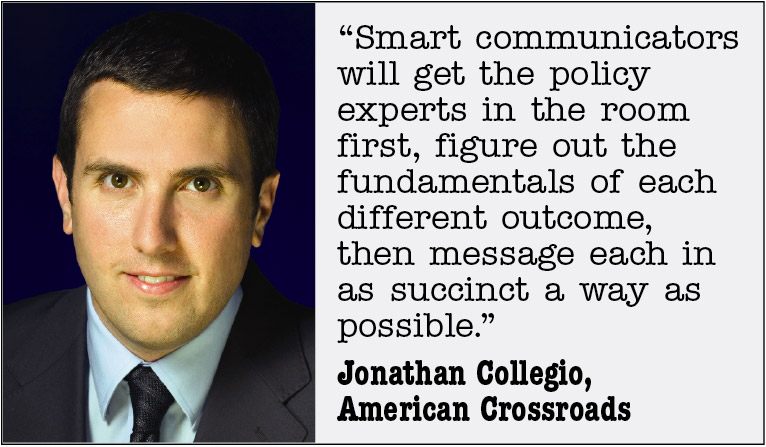Suffice to say, this presidential election season has been a boon to PR News, with the potential for several articles daily on any number of communications topics.
There is, however, a thorny issue that has cropped up that not only touches PR, but intersects the topics of business, political discourse and free speech. And that issue is recent communications from corporate leadership to their employees that strongly implies to vote for one candidate or another, or else their jobs may be in peril.
On Oct. 14 it was reported that employees of paper company Georgia-Pacific, owned by billionaire brothers David Koch and Charles Koch, received a mailing that stated they would “suffer the consequences, including higher gasoline prices, runaway inflation, and other ills” if they voted for candidates not supported by Koch-owned companies or its political fundraising arm.
The company also provided workers with a list of those candidates it supports. At the top: Mitt Romney, according to In These Times, which broke the story.
As the story went public, Georgia-Pacific issued a statement on kochfacts.com defending the action. “This is in no way an attempt to ‘intimidate’ employees,” Greg Guest, senior director of corporate communications at Georgia-Pacific, said. While the Koch brothers are well-known for their support of the GOP, Guest tried to quash any notion of partisanship. “Our support is not based on party affiliation, and we support both Republicans and Democrats who support market-based policies and solutions,” Guest said.
In the days after the Georgia-Pacific news broke, there were other reported instances of corporations suggesting to their employees whom to vote for (see the sidebar for more details).
For a communications take on this issue, PR News asked both internal relations and corporate communications pros for their takes on this practice, and how they might handle such situations.
Such veiled threats are detrimental to both the company and its employees, says Kent Jarrell, executive director of the litigation communication practice at APCO Worldwide in Washington, D.C. Externally it’s an embarrassment, makes the company look out of touch and makes leadership look bad. “Unfortunately that also reflects on the employees,” says Jarrell. Internally, such an edict makes employees feel that they’re being lectured to. “Condescension and arrogance are not good,” says Jarrell.
As a communicator, there are more clever, subtle ways for a CEO to get such a message out that is not so threatening, he adds. It might go something like this: “I hope everyone is paying attention to the election, because this is an important time. I’d like to share my views on some of the issues….”
LAW–ABIDING BUSINESSES
 |
Betty Henry, a communications consultant specializing in employee communication and crisis and change management, thinks the practice is a bad idea all the way around. “Law-abiding corporations should support individual freedoms,” says Henry.
So what if as a communicator she learned that her CEO had made a Koch-like statement to employees? “I’d ask him to immediately clarify to employees that even though his or her views were made public, they should feel free to vote for who you think is the best candidate,” says Henry.
 |
Georgia-Pacific’s action does have some support, however. Jonathan Collegio, communications director at American Crossroads, the super PAC formed by GOP strategist Karl Rove, says its smart and “absolutely appropriate for businesses to communicate to their employees how Washington will impact their industries and ultimately their livelihoods.”
Collegio contends that companies are doing employees a favor by providing guidance on key issues, and surveys show that employees trust employers who do so. “Workers in coal electricity plants should know that President Obama has publicly said he wants to bankrupt their industry,” says Collegio. “That information is critical for those employees to make an informed choice on Nov. 6.”
While it’s true that Collegio has some “skin in the game,” as they say, his argument that since workers unions send all kinds of information to their members on what to vote for on key issues, management should do the same does hold some water.
DOUBLE STANDARD?
Andrew Goldberg, EVP at Makovsky, says you have to put the Georgia-Pacific situation in context. Historically, labor unions have had no problem telling their members how to vote.
“There tends to be in the mainstream press a sense of surprise when companies feel like they should be doing the same thing,” says Goldberg. “Company or labor union, it’s entirely legal under the rules of free speech.”
Goldberg believes that the tactic might be appropriate depending on the company and its culture, and employees may actually want some guidance on issues. But again, the boundary is when the message sounds coercive. “It’s destructive to any loyalty you may have built up in the company,” says Goldberg.”
Bottom line: The right to vote is woven into the American fabric, says Jarrell. Any messaging that impinges on that right will likely backfire. PRN
CONTACT:
Kent Jarrell, [email protected]; Betty Henry, [email protected]; Jonathan Collegio, [email protected]; Andrew Goldberg, [email protected].
Follow Scott Van Camp: @svancamp01
